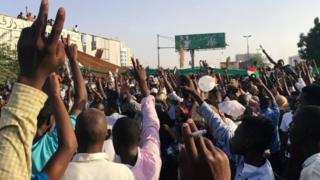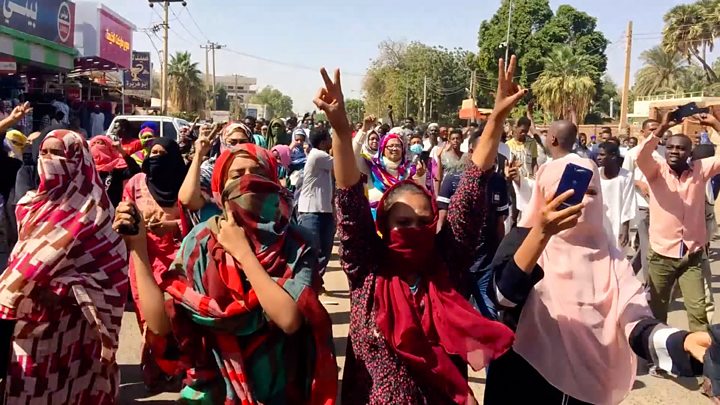Sudan protest: Demonstrators continue sit-in despite crackdown
 Image copyright
Reuters
Image copyright
Reuters
Protesters in Sudan calling for the resignation of President Omar al-Bashir are defying a crackdown by the security forces by continuing to camp out.
Thousands are staging a sit-in outside a compound in the capital, Khartoum, where the president has his residence.
On Monday, opposition politicians jointed protesters, who are seeking talks with the army about forming a transitional government.
Seven protesters have been killed since Saturday, officials say.
The country's interior minister told parliament on Monday that six people had been killed in the capital over the weekend, and one in Darfur.
He said 15 protestors and 42 members of the security forces had been injured and said almost 2,500 people had been arrested.
Why are they protesting?
Protests against Mr Bashir, who has governed Sudan since 1989, have been under way for several months.
The protests were originally sparked by a hike in the cost of living, but demonstrators are now calling for the president to resign.

Over the weekend, a large group gathered outside the Khartoum headquarters of the army, defence ministry and the president.
Protesters want the armed forces to withdraw their support of the government.
On Monday night representatives of the protesters said they were seeking talks with the army regarding the formation of a transitional government.
Omar el-Digeir, a senior protest member, told AFP news agency the group were seeking a path "that represents the wish of the revolution".
Monday marked the third night of the sit-in, despite security force efforts to disperse the group.
The government has been criticised by rights groups for a heavy-handed response to the unrest.
What has the response been?
Reports about security force actions and the army response so far have been conflicting.
On Monday several eyewitnesses suggested some members of the military had moved to protect protesters from security forces.
One protester told the BBC's Newsday programme that members of the forces in pick-up trucks had used tear gas and live ammunition to try and disperse the thousands taking part in the sit-in overnight.
She said the military was at first neutral but then tried to chase the security forces away.
Other eyewitnesses have alleged the military fired warning shots while chasing the forces off.
Activists organising the protests claim one soldier was killed while trying to defend protesters, the Associated Press reports.
Information Minister Hassan Ismail, who is a spokesman for the government, has contradicted the reports about the splintering.
"The security apparatus are coherent together and working with positive energy and in harmony," he said on Monday.
United Nations Secretary-General António Guterres has urged all parties to "exercise utmost restraint and avoid violence".
Government officials now admit 38 people have died since the unrest began, but the pressure group Human Rights Watch says the number is higher.
Why is the president controversial?
Mr Bashir's rule has been blighted by accusations of human rights abuses.
He is subject to an International Criminal Court (ICC) arrest warrant over accusations of of genocide, war crimes and crimes against humanity.
The US imposed sanctions against the country more than 20 years ago, accusing Khartoum of sponsoring terror groups.
Last year the Sudanese pound fell rapidly in value while inflation rose, putting even more pressure on the country's economy. The government then announced the price of fuel and bread would rise, sparking protests.
In February, it looked as though the president might step down, but instead Mr Bashir declared a state of national emergency.
The latest protests mark the 34th anniversary of the coup that overthrew the regime of former President Jaafar Nimeiri.
Have you recently taken part in the demonstrations? Get in touch by emailing haveyoursay@bbc.co.uk
Please include a contact number if you are willing to speak to a BBC journalist. You can also contact us in the following ways: